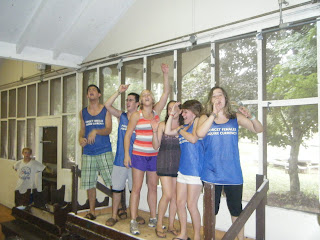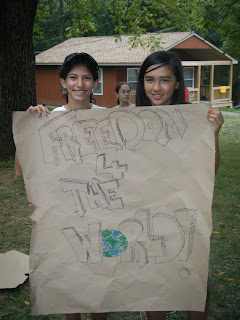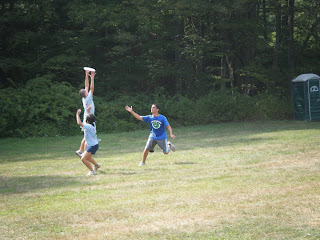
This morning when we woke up Galil was fully of many sleepy chanichim (campers) and tzevet (staff). It's a different kind of sleepy than the mid afternoon siesta time, it's the kind of sleepy where you begin to just let go because you are closer to the finish line than ever before. Some of us have been running since the second week in June, and as hackneyed is it is, all good things must come to an end. We get lots of crying on the last days of machaneh (camp). The tears are not just for saying bye to friends new and old, and it's not just about leaving this place for the next year, it's about the end of a process. A parent said to us as

she signed out her crying child, "It's like she lived a whole life in three weeks."
Here, more than in most places, we pay tribute to the process. We recognize the importance of the beginning, the middle, the end, and everything in between. The kids get it too. Sure they may not love all of their peulot (programs) but they understand what an integral role our
collective learning plays in the success of our community.
During lunch today, the Bogrim staffed toranut
(kitchen duty) and played us the soundtrack of

the summer as we ate. It wasn't that intentional, but that's just how it played out. Each song stirred a memory of a different part of of the summer and brought us back to the place where we spontaneously stood and sang "Waving Flag" on world cup night or "Cecilia" when we wanted people to be energetic at breakfast. Each shicvah (age group) sang with more ruach (spirit) than the average day, because what they brought today needed to last them through the year.
And lastly, in honor of the process, I felt the need
to write one last post to conclude the summer.

I got the opportunity to experience this summer by living it here and then translating the experience with all of you. Hopefully there is a better understanding of what happens at Galil and now, when our campers share their experience with you, they'll be shocked that you know what they're talking about. Thanks for all of your support and your feedback, writing the blog has been one of the highlights of the summer.

 happens at the end of each session. We pushed our imaginations to the limit in projecting Bollywood films on the ceiling of the chadar while we danced to Slumdog Millionaire's Jai Ho. We made curried popcorn on the front mirpeset (porch) of the chadar ochel and henna painted kids arms. And then just as we had Bollwood tossed to us, we tossed it away to become the next thing: the audience at the last medurah (bonfire) of the summer. Jokes were told, acts were heckled, two Bogrim were covered in shaving cream by the time the fire went out, and torches were passed from one person to another for who will be joking and heckling in the summer
happens at the end of each session. We pushed our imaginations to the limit in projecting Bollywood films on the ceiling of the chadar while we danced to Slumdog Millionaire's Jai Ho. We made curried popcorn on the front mirpeset (porch) of the chadar ochel and henna painted kids arms. And then just as we had Bollwood tossed to us, we tossed it away to become the next thing: the audience at the last medurah (bonfire) of the summer. Jokes were told, acts were heckled, two Bogrim were covered in shaving cream by the time the fire went out, and torches were passed from one person to another for who will be joking and heckling in the summer of 2011. Definitely both sad and exciting at the same time. And we, the Jack of all Trades madrichim tell the chanichim (campers) that it will all be okay, and that they will see their friends at Fall Seminar, our weekend-overnight in early fall.
of 2011. Definitely both sad and exciting at the same time. And we, the Jack of all Trades madrichim tell the chanichim (campers) that it will all be okay, and that they will see their friends at Fall Seminar, our weekend-overnight in early fall.  chanichim had already forgotten and were ready for the next thing. The Bonim tried to weasel their way into getting the largest scoops possible and the Chalutzim created their best sundae for a Saturday night.
chanichim had already forgotten and were ready for the next thing. The Bonim tried to weasel their way into getting the largest scoops possible and the Chalutzim created their best sundae for a Saturday night. 































 peulat shicvah (a program by age group), which we refer to as pish. During this time, aside from the method of the peulah, there is also a latent learning function where the kids in each shicvah bond with one another by sharing in the same learning frame and process. Today, the Sayarim (post 6th graders) went on a scavenger hunt to familiarize themselves with the locations at machaneh and find their "missing kvutzah (group) member" to recognize the contribution of each individual to the group. And in a similar vein, the Bonim (post 8th grade) discussed inequality through exploring varying access to resources by breaking the chanichim into groups and giving each group different amounts of materials to make a raft that floats.
peulat shicvah (a program by age group), which we refer to as pish. During this time, aside from the method of the peulah, there is also a latent learning function where the kids in each shicvah bond with one another by sharing in the same learning frame and process. Today, the Sayarim (post 6th graders) went on a scavenger hunt to familiarize themselves with the locations at machaneh and find their "missing kvutzah (group) member" to recognize the contribution of each individual to the group. And in a similar vein, the Bonim (post 8th grade) discussed inequality through exploring varying access to resources by breaking the chanichim into groups and giving each group different amounts of materials to make a raft that floats.








